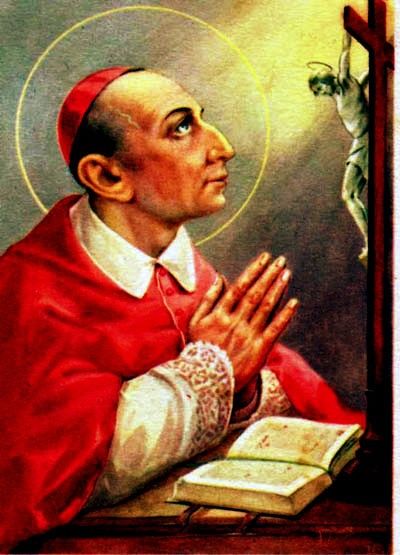OUR PATRON - ST. CHARLES BORROMEO
We, the sisters of St. Charles are privileged to have St. Charles Borromeo as our Patron. We endeavor to imitate our Patron to become closer to God and his people. We can proudly affirm that St. Charles was a forerunner of Synod on Synodality! Here is an overview of his life history:
Birth and Early Life: St. Charles Borromeo was born on October 2, 1538, into the prominent Borromeo family in the castle of Arona, near Milan, Italy. His family was wealthy and influential, with connections to the ruling class.
Education: Charles received an excellent education, studying at the University of Pavia and later at the University of Padua. He earned a doctorate in civil and canon law by the age of 21.
Ecclesiastical Career: Charles Borromeo was appointed cardinal-deacon by his uncle, Pope Pius IV, at the age of 22. He was ordained a priest and consecrated as a bishop in 1563. Charles was given several important positions within the Church, including the administration of the Archdiocese of Milan.
Archbishop of Milan: In 1564, Charles became the Archbishop of Milan, one of the most significant ecclesiastical positions in Europe. At that time, Milan was in a state of moral and spiritual decline. Charles took on the challenge of revitalizing the Church and addressing various issues, including corruption among the clergy.


Council of Trent: St. Charles Borromeo played a crucial role in implementing the reforms outlined by the Council of Trent. He worked to enforce discipline among the clergy, established seminaries for the education of priests, and reformed religious orders. His efforts aimed to improve the spiritual and moral standards of the clergy and laity.
Pastoral Care and Charity: Charles was known for his pastoral care, often personally visiting parishes and hospitals. He established the Confraternity of Christian Doctrine to ensure the proper education of the faithful. Additionally, he engaged in various charitable works to alleviate the suffering of the poor during times of famine and plague.
Personal Piety and Austerity: Despite his high social status, St. Charles Borromeo led a life of personal piety and austerity. He embraced a simple lifestyle, often wearing plain clothing and dedicating much of his wealth to charitable causes.
A man of God: He was a man after the heart of God, after the heart of Jesus. He endeavored to please God his creator in all things. He was a man of prayer, he spent hours at a stretch before the Crucifix, had great devotion to the passion of Christ, to the Eucharist and Word of God. Nothing disturbed him from prayer and contemplation. Prayer was accompanied with severe penance and mortification that nobody could imitate him. When he prayed his face was so radiant because of his deep union with God.
A man of the Church: He died at the young age of 46 and more than 26 years were spent working hard to reform the church in all the ways possible. Volumes are written about the reform he undertook to bring about radical change in the Rome, in Milan in the surrounding dioceses, in fact in whole of Europe including Institutes, seminaries, religious orders, Monasteries, convents, family life even up to renewing the catechism of the Church. Such is the great role he played that this period is known as the period of St. Charles Reformation. His great role during the famous Council of Trent is acclaimed by all the fathers of the Church.
A man with others and for others: He was especially a man for the poor, widows and the orphans. After giving himself for the reformation of the church his later years were totally dedicated in the service of the people especially when Milan and surrounding towns were affected by 2 big calamities, first the famine and within few years thousands of people were afflicted with a terrible plague which destroyed half of the population. His charity knew no bounds and he sold his property, the property of his family and even the treasures of the church to feed and take care of the plague stricken people. He used to feed freely more than 30000 people a day, many of them came from neighbouring towns hearing about his generosity and boundless love for the poor.
Death and Canonization: St. Charles Borromeo died on November 3, 1584, at the age of 46. He was canonized as a saint by Pope Paul V in 1610. His feast day is celebrated on November 4. St. Charles Borromeo is remembered for his contributions to the Catholic Counter-Reformation, his commitment to the spiritual renewal of the Church, and his exemplary life of holiness and service.
A great saint lived an exceptional saintly life that God was pleased to take him to himself at a young age but he was consumed like a burning candle giving life and light to others. His famous motto was HUMILITAS although belonging to a princely family and his words were that one should preach God with one’s life more than words and like a candle should burn for others to give light.
